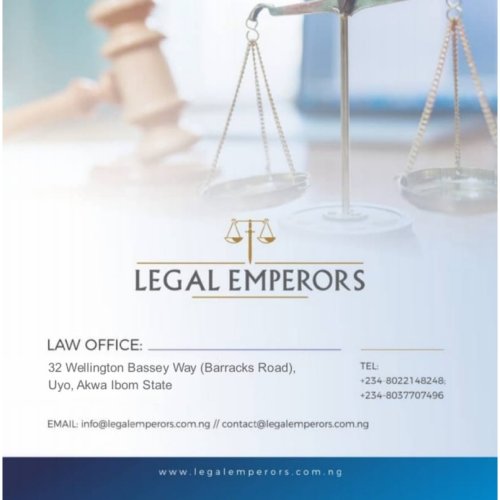Best Oil, Gas & Energy Lawyers in Uyo
Share your needs with us, get contacted by law firms.
Free. Takes 2 min.
List of the best lawyers in Uyo, Nigeria
About Oil, Gas & Energy Law in Uyo, Nigeria
Uyo, the capital city of Akwa Ibom State in Nigeria, is located in a region rich in oil and gas resources. The oil and gas industry is a significant contributor to the local and national economy, offering numerous opportunities and challenges. Specifically, oil and gas law covers exploration, extraction, production, transportation, and distribution of oil and gas resources. Additionally, energy law encompasses the legal frameworks relating to renewable energy sources, environmental regulations, and sustainability issues. The legal landscape in Uyo for this sector is influenced by both national and international policies as well as local customary laws.
Why You May Need a Lawyer
Navigating the complexities of oil, gas, and energy law can be challenging, and legal assistance might be required in several scenarios, including:
- Negotiating and drafting contracts related to exploration and production activities.
- Resolving disputes over land rights and mineral ownership.
- Ensuring compliance with environmental regulations and safety standards.
- Addressing issues related to taxation, royalties, and revenue sharing.
- Seeking representation in legal matters concerning oil spills or accidents.
- Guidance on regulatory approvals for energy projects.
Local Laws Overview
The legal framework governing oil, gas, and energy in Uyo is a combination of federal laws, state regulations, and customary law. Some key aspects include:
- The Petroleum Act: Governs the exploration and production of petroleum resources in Nigeria, including licensing and leases.
- The Nigerian Oil and Gas Industry Content Development Act: Focuses on promoting local involvement and development within the industry.
- Environmental Regulations: Laws that provide guidelines for environmental protection and management related to oil and gas activities.
- Customary Law: Plays a role in land ownership and tenure systems locally, which can impact exploration and drilling rights.
Frequently Asked Questions
What are the main laws governing the oil and gas sector in Nigeria?
The Petroleum Act, the Nigerian Oil and Gas Industry Content Development Act, and various environmental regulations are primary laws governing the sector.
Who regulates oil and gas operations in Uyo?
The Department of Petroleum Resources (DPR) and the Nigerian National Petroleum Corporation (NNPC) oversee operations in Nigeria, including Uyo.
How does customary law affect oil and gas rights in Uyo?
Customary law influences land ownership and can impact leasing and exploration rights, often requiring negotiation with local communities.
What environmental protections are in place for oil and gas activities?
Strict regulations exist to protect the environment from oil spills, pollution, and other impacts, with oversight by the National Environmental Standards and Regulations Enforcement Agency (NESREA).
Are there opportunities for renewable energy development in Uyo?
Yes, with a growing interest in sustainability, there are opportunities for solar and other renewable energy projects.
What should be included in a contract for oil exploration?
Contracts should address terms of exploration, rights and obligations, revenue sharing, compliance with laws, and dispute resolution mechanisms.
How is local content regulated in the oil and gas sector?
The Nigerian Oil and Gas Industry Content Development Act mandates the promotion of local businesses and workforce in the sector.
What are the tax implications of operating in the oil and gas sector?
Operators must comply with various tax obligations, including royalties, petroleum profit tax, and import duties.
What role does the government play in oil and gas activities?
The government regulates the industry through policy making, licensing, and revenue collection, while also promoting local investment.
How can I resolve a dispute with a partner or contractor?
Disputes can be resolved through mediation, arbitration, or litigation, depending on the contract terms and severity of the issue.
Additional Resources
Several resources and organizations can provide further assistance:
- Department of Petroleum Resources (DPR): Responsible for licensing and regulations.
- Nigerian National Petroleum Corporation (NNPC): Oversees the oil and gas sector policy.
- National Environmental Standards and Regulations Enforcement Agency (NESREA): Manages environmental regulations.
- Local Bar Associations: Can offer referrals to qualified oil and gas lawyers.
Next Steps
If you need legal assistance in the oil, gas, and energy sector in Uyo, here is how you can proceed:
- Conduct research to identify lawyers specializing in oil, gas, and energy law.
- Consult with multiple attorneys to assess their expertise and experience.
- Prepare relevant documentation and information related to your issue.
- Discuss potential legal strategies and outcomes with your chosen lawyer.
- Follow through diligently with your lawyer's advice and the defined legal processes.
Lawzana helps you find the best lawyers and law firms in Uyo through a curated and pre-screened list of qualified legal professionals. Our platform offers rankings and detailed profiles of attorneys and law firms, allowing you to compare based on practice areas, including Oil, Gas & Energy, experience, and client feedback.
Each profile includes a description of the firm's areas of practice, client reviews, team members and partners, year of establishment, spoken languages, office locations, contact information, social media presence, and any published articles or resources. Most firms on our platform speak English and are experienced in both local and international legal matters.
Get a quote from top-rated law firms in Uyo, Nigeria — quickly, securely, and without unnecessary hassle.
Disclaimer:
The information provided on this page is for general informational purposes only and does not constitute legal advice. While we strive to ensure the accuracy and relevance of the content, legal information may change over time, and interpretations of the law can vary. You should always consult with a qualified legal professional for advice specific to your situation.
We disclaim all liability for actions taken or not taken based on the content of this page. If you believe any information is incorrect or outdated, please contact us, and we will review and update it where appropriate.








